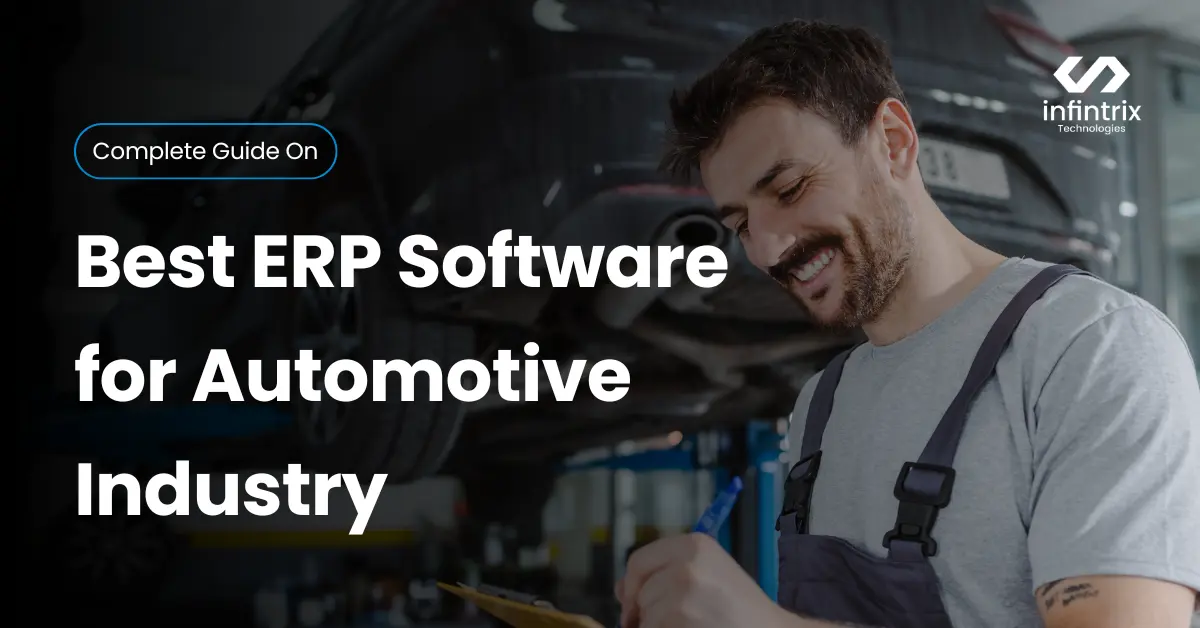The automotive industry moves fast. From global supply chains to EV manufacturing, decision makers juggle complex operations every day. That’s where ERP software steps in—it connects finance, production, sales, and compliance into one system.
For manufacturers, suppliers, and even garage owners, this isn’t just about technology. It’s about building resilience against recalls, stricter regulations, and the push toward digital transformation. The right ERP for automotive industry makes it easier to manage thousands of moving parts without losing sight of the big picture.
Infintrix Solutions has worked with businesses facing these exact challenges, making them a trusted partner in ERP solutions tailored for automotive growth.
Why Automotive Companies Need ERP Software
Running an automotive company without ERP software is like trying to assemble a car without a blueprint. Everything might fit together eventually, but the delays, errors, and costs can be painful.
With automotive ERP, businesses get real-time control over production schedules, compliance checks, and supply chain visibility. That means fewer surprises, more predictable outcomes, and the ability to scale operations with confidence.
Challenges in the Automotive Supply Chain
The automotive supply chain is a balancing act. Many manufacturers rely on just-in-time production, which cuts costs but leaves little room for error. A single late shipment of chips or parts can halt entire production lines.
Global sourcing adds another layer of complexity. Tariffs, shipping delays, and compliance rules can change overnight. Without a strong ERP system, tracking these disruptions becomes almost impossible, putting profitability and customer trust at risk.
The Role of Digital Transformation
Technology is reshaping how cars are designed, built, and delivered. Automotive ERP plays a central role in this shift by supporting Industry 4.0 initiatives like smart factories and connected ecosystems.
Think of ERP as the bridge that links IoT ERP, predictive analytics, and MES integration into one coherent view. For companies investing in EV manufacturing or hybrid operations, this integration isn’t optional—it’s how they stay competitive in a rapidly changing market.
Key Features of the Best ERP Software for the Automotive Industry
Not all ERP solutions are created equal. When it comes to the automotive sector, some features of automotive ERP aren’t “nice to have” — they’re non-negotiable. The right automotive ERP helps companies manage compliance, improve efficiency, and keep up with fast-changing customer demands.
Below are the core areas every automotive company should look for when comparing ERP vendors.
Supply Chain & Inventory Management
A strong ERP can track thousands of parts across multiple plants and suppliers. It improves vendor collaboration, reduces shortages, and brings better visibility to your supply chain operations.
Production & Quality Control
Automotive ERP software standardizes production workflows while supporting safety and compliance standards like ISO and NHTSA. This reduces rework and improves product reliability.
Finance & Cost Tracking
ERP connects accounting with production data, making it easier to control budgets and forecast costs. That means fewer surprises at the end of each quarter.
CRM & Dealer Management
Beyond factories, a good ERP system strengthens relationships with dealer networks. It helps coordinate inventory, service requests, and customer interactions in one place.
Compliance & Traceability
From recalls to audits, compliance is always a priority in the automotive industry. ERP provides batch and lot tracking so businesses can respond quickly when issues arise.
Infintrix Solutions has helped companies build these capabilities into daily operations, giving them both real-time visibility and long-term resilience.
Benefits of ERP for Automotive Companies
Here’s the good news: adopting the right automotive ERP delivers measurable results. It’s not just about compliance or data—it’s about creating a leaner, smarter business.
Key benefits include:
- Higher efficiency and lower costs across operations.
- Real-time insights for smarter decision-making.
- Greater scalability for global growth.
- Smoother collaboration between departments and locations.
The key takeaway? With the best ERP software, companies shift from constantly reacting to proactively planning.
How to Choose the Right Automotive ERP Software
Choosing the right ERP is a bit like choosing the right car. You don’t just look at the features—you think about your needs, budget, and how well it fits your journey ahead.
Assess Your Business Needs
List your biggest challenges: are they in compliance, production, or the supply chain? Match those gaps with ERP features.
Compare Deployment Options
Cloud ERP offers flexibility and lower upfront costs, while on-prem ERP may be better for companies needing full control. The choice depends on budget and IT resources.
Evaluate Vendor Expertise in Automotive
A vendor who understands the automotive industry will deliver faster ROI. They’ll also offer modules designed for EV manufacturing or dealer management.
Integration Capabilities
Your ERP should connect smoothly with PLM integration, MES integration, and dealership systems. Without this, you risk creating silos.
Total Cost of Ownership & ROI
Don’t just compare license fees. Look at upgrades, training, and long-term support. A slightly higher upfront cost can often mean lower expenses over time.
Top ERP Solutions for the Automotive Industry (with Comparisons)
When you’re looking at ERP vendors, it’s tempting to go for the biggest name. But the “best ERP software” for your automotive shop or factory may not be the same as for an OEM. Below are standout players (SAP, Oracle, Infor, Epicor) and what they bring to the table in the automotive world.
SAP
SAP is often synonymous with scale and depth in enterprises. Its S/4HANA Cloud (and hybrid deployment modes) offer strong global ERP capabilities, in-memory analytics, and modular design.
In automotive use, SAP shines in logistics modules, material management, shop floor integration, and compliance across plants.
Oracle
Oracle’s cloud ERP is potent with features for discrete manufacturing, advanced supply chain, and real-time planning.
It handles complex inventory flows well—ideal for Tier-1 suppliers juggling multiple plants and SKU variants.
Infor
Infor’s automotive ERP offering (CloudSuite Automotive) is tailored for vehicle manufacturers, tier suppliers, and those in EV/hybrid segments.
It supports multi-mode manufacturing, preconfigured best practices, and helps companies adapt fast to regulatory shifts.
Epicor
Epicor is more nimble and often preferred in mid-market automotive setups. Compare ERP
It offers strong product data management (PDM), change control, and shop floor control capabilities.
Best ERP for Small to Mid-Sized Automotive Businesses
For smaller firms, customization, cost, and modular growth matter most. A lighter ERP—perhaps delivered via cloud or hybrid model—often makes sense.
- Epicor (or its “light footprint” versions) is a strong contender.
- Infor’s scaled modules can work well in this segment.
- SAP’s “Business One” line might suit very small operations, though it has limitations in deep automotive features.
Best ERP for Large Automotive Enterprises
At the top end, you need full global ERP, compliance across countries, heavy traceability, advanced planning, and deep integration.
- SAP S/4HANA is often the go-to for OEMs.
- Oracle offers strong capabilities here too.
- Infor remains competitive especially in subassemblies, complex manufacturing, or when process + discrete overlap.
Comparison Table Example
| Vendor / ERP | Strength in Automotive ERP | Best Fit Segment | Notable Features |
| SAP (S/4HANA) | Global operations, deep logistics & compliance | Tier-1 OEM, large groups | Hybrid cloud, in-memory analytics, strong global reach |
| Oracle Cloud ERP | Discrete manufacturing + supply chain | Large to enterprise | Real-time planning, advanced inventory control |
| Infor (CloudSuite Automotive) | Blend of process + discrete, EV support | Suppliers, mid-large firms | Best practices templates, adapts fast |
| Epicor (Kinetic / vision etc.) | Agile, modular, shop-floor focus | Mid-market & growing firms | PDM, customization, production control tools |
Think of Infintrix Solutions as a niche “bridge” ERP provider—one that pairs deep automotive ERP know-how with flexibility to serve suppliers, garages, and EV startups. You get hands-on support and a system built around your growth path.
Implementation Best Practices for Automotive ERP Success
Adopting an automotive ERP isn’t just about buying software. Success depends on people, process, and planning. Here’s how to do it right:
Building the Right ERP Team
Mix IT leaders, finance, production heads, and shop-floor operators. This ensures the system works for everyone, not just the back office.
Training and Change Management
The best ERP software fails if people don’t use it. Invest in training, workshops, and ongoing support so employees adapt faster.
Phased Rollouts vs. Big Bang
Rolling out ERP in phases reduces disruption. Big bang launches can work for smaller businesses, but in large plants, staged adoption usually wins.
Common Mistakes to Avoid
Don’t underestimate data migration. Also, avoid choosing a vendor without real automotive industry expertise—it often leads to costly customizations.
Future of ERP in the Automotive Industry
The next decade will reshape how ERP systems power the automotive world.
- AI & Predictive Analytics → Better demand forecasting, predictive maintenance, and smarter planning.
- IoT ERP Integration → Connected sensors offer real-time shop floor visibility.
- Sustainability & Green Manufacturing → ERP helps track emissions, materials use, and compliance with eco-regulations.
The takeaway: ERP isn’t static—it evolves alongside digital transformation and Industry 4.0.
Why Choose Infintrix Solutions for Automotive ERP Software?
Every company is different. That’s why Infintrix Solutions built its automotive ERP to handle both process and discrete ERP needs. Whether you’re a supplier, an OEM, or an EV startup, scalability and compliance are built in from day one.
Key advantages include:
- Hybrid (cloud + on-prem) flexibility.
- Advanced traceability for recalls and audits.
- Designed for growth across suppliers, dealerships, and global networks.
FAQs About ERP for the Automotive Industry
What is the best ERP software for automotive suppliers?
It depends on your size and complexity. Suppliers benefit most from ERP with hybrid manufacturing support and flexible supply chain tools.
How much does automotive ERP cost?
Costs vary widely—anywhere from mid five figures to six figures annually, depending on vendor and deployment (cloud vs. on-prem ERP).
How long does it take to implement ERP in an automotive company?
Typically 3–12 months. A phased rollout can shorten disruption.
Can ERP integrate with PLM or MES systems?
Yes. Modern ERP solutions are built with PLM integration and MES integration in mind for smoother workflows.
Is cloud ERP secure enough for automotive data?
Yes—leading ERP vendors use layered security. Regular audits are essential to maintain compliance.
Conclusion: Choosing the Best ERP for Automotive Growth
Picking the best ERP software isn’t about the flashiest demo. It’s about alignment—choosing a solution that matches your operations, supply chain, and compliance goals. Done right, ERP turns challenges like recalls, digital transformation, and global sourcing into opportunities for growth.
At Infintrix Solutions, we’ve seen how the right automotive ERP transforms businesses—from EV startups to established manufacturers. With tailored modules, scalability, and a hands-on support approach, we help companies simplify complexity and plan for the road ahead. If you’re exploring ERP, we’d be glad to guide you toward the right fit.

